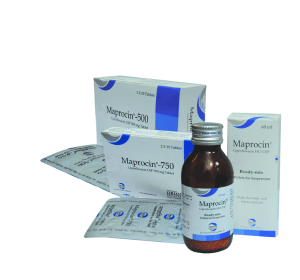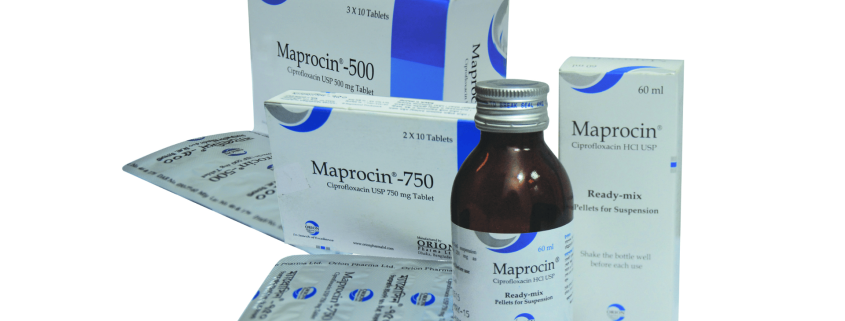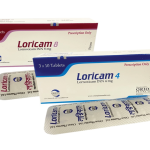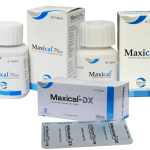Maprocin

ANTIBIOTICS: Ciprofloxacin Hydrochloride
Indication
Typhoid fever, urinary tract infections, respiratory tract infections, gastro-intestinal tract infections, uro-genital tract infections, bone & joint infections, skin & skin structure infections, gonorrhea and other sexually transmitted diseases, severe systemic infections, surgical prophylaxis.
Contraindication
Maprocin is contraindicated in patients who have shown hypersensitivity to Ciprofloxacin and other quinolones. Maprocin is also contraindicated in pregnant women and nursing mothers, except where the benefits of the treatment exceed the risk.
Dosage & Administration
Recommended dose is 250 – 750 mg (5 ml to 15 ml) twice daily.
Urinary Tract Infections
Acute uncomplicated – 250 mg 12 hrly – 3 Days
Mild / Moderate – 250 mg 12 hrly – 7-14 Days
Severe / Complicated – 500 mg 12 hrly – 7-14 Days
Chronic Bacterial Prostatitis
Mild / Moderate – 500 mg 12 hrly – 28 Days
Lower respiratory tract infection
Mild / Moderate – 500 mg 12 hrly – 7-14 Days
Severe / Complicated – 750 mg 12 hrly – 7-14 Days
Typhoid Fever
Mild / Moderate – 500 mg 12 hrly – 10 Days
Infectious diarrhea
Mild / Moderate / Severe – 500 mg 12 hrly – 5-7 Days
Bone & joint infection
Mild / Moderate – 500 mg 12 hrly – 4-6 Weeks
Severe / Complicated – 750 mg 12 hrly – 4-6 Weeks
Skin & skin structure infections
Mild / Moderate – 500 mg 12 hrly – 7-14 Days
Severe / Complicated – 750 mg 12 hrly – 7-14 Days
Urethral and cervical gonococcal infections
Uncomplicated – 250 mg Single dose – Single dose
Side Effect
Maprocin is generally well tolerated. Frequent adverse reactions are nausea, convulsion, confusion, hallucination, tiredness, skin rashes, pruritus, photosensitivity, transient increase in lever enzymes, diarrhea, vomiting etc.
Drug Interaction
Ciprofloxacin, like other fluoroquinolones, should be used with caution in patients receiving drugs known to prolong QT interval. The simultaneous administration of ciprofloxacin (oral) and multivalent cation-containing drugs and mineral supplements polymeric phosphate binders sucralfate or antacids, and highly buffered drugs containing magnesium, aluminium, or calcium reduces the absorption of ciprofloxacin. Metoclopramide accelerates the absorption of ciprofloxacin (oral) resulting in a shorter time to reach maximum plasma concentrations. Concomitant administration of ciprofloxacin and omeprazole containing medicinal products results in a slight reduction of Cmax and AUC of ciprofloxacin. Tizanidine must not be administered together with ciprofloxacin. Renal tubular transport of methotrexate may be inhibited by concomitant administration of ciprofloxacin. Concurrent administration of ciprofloxacin and theophylline can cause an undesirable increase in serum theophylline concentration.
Storage
Keep in a cool and dry place and protect from light and moisture.



